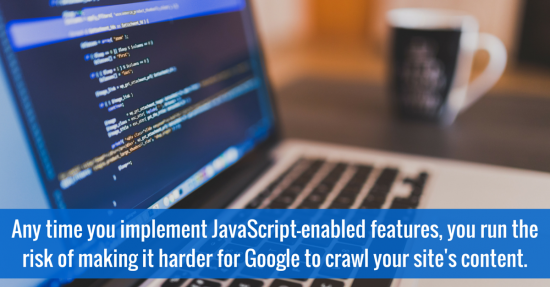Infinite Scroll & SEO: Do They Mix? was originally published on BruceClay.com, home of expert search engine optimization tips.
At a recent SEO training, I met a webmaster who excitedly told me that he was going to soon be implementing infinite scroll on his website. LATimes.com’s indefinitely scrolling articles immediately popped into my head and I told him that was awesome … and then I wondered why we don’t use infinite scroll on our own blog or site. So I sought out our SEO Manager Robert Ramirez’s search engine optimization advice when I returned back to the office.
He agreed that there are benefits to infinite scrolling, noting that it may improve:
- User experience, as it can lead users to content they might not have otherwise discovered
- Time on page, as users theoretically read longer
- Load time of above-the-fold content
However, infinite scroll carries risk for content indexing and ranking, and may even decrease user interaction on the site.
Read on to discover what infinite scrolling is, the potential SEO hazard it poses, the problems Etsy encountered when it added infinite scroll, and why our recommendation is to proceed with caution.
What Is Infinite Scroll?
First, a definition. Infinite scrolling is the process of loading content when the user brings it into view — an image, a video, or content won’t load until it needs to load, i.e. when the user scrolls or clicks.
Note: Technically, infinite scrolling is not actually infinite — it’s seemingly infinite. Take Twitter for example — spend a day or two continually scrolling, and you’d eventually reach the end of tweets.
Infinite Scroll in the Wild
Social media sites such as Twitter, Facebook, Google+ and Pinterest all use a variation of infinite scrolling. Infinite scrolling is also used on media sites such as LATimes.com and ESPN.com — when one article ends the user literally scrolls right onto another one. Infinite scrolling is also used on product pages for some ecommerce sites.
How Infinite Scroll Can Hurt SEO
Any time you implement JavaScript-enabled features, you run the risk of making it harder for search engines, like Google, Yahoo and Bing, to crawl your site’s content.
Last year, Google Webmaster Trends Analyst John Mueller summed up the problem on the Google Webmaster Central Blog:
“With infinite scroll, crawlers cannot always emulate manual user behavior—like scrolling or clicking a button to load more items—so they don’t always access all individual items in the feed or gallery. If crawlers can’t access your content, it’s unlikely to surface in search results.”
In order to be crawled, each article or page of products must have its own natural crawl path, i.e. an individual URL that is linked to within the site.
For those who are sold on infinite scrolling, the ultimate search engine optimization advice comes from Mueller’s must-read “Infinite Scroll Search-friendly Recommendations.” Here he outlines the steps for how to implement infinite scroll while still having content that stands to be indexed.
Infinite Scroll Is Good for User Experience … But Not Always
In theory, infinite scroll will keep your users scrolling through content on your pages, but sometimes the infinite scrolling backfires. Because people aren’t necessarily conditioned to scroll rather than click, they might find the experience awkward and/or overwhelming. Consider this takeaway from a recent Nielsen study:
“There are psychological consequences to endless scrolling that can hurt the user experience as well. For task-driven activities, infinite scrolling can feel like drowning in an information abyss with no end in sight. People who need specific types of information expect content to be grouped and layered according to relevance, by pages. Web users don’t mind clicking links (e.g., a link to the next page) if each click is meaningful and leads them closer to the desired goal.”
Etsy: A Cautionary Tale
The popular handmade and vintage item marketplace site Etsy implemented infinite scroll in 2012 and the results were less than positive. Users clicked and favorited fewer items. They also bought fewer items from search. Etsy users didn’t like the change, and, accordingly, Etsy removed infinite scroll from the site. Etsy’s formal principal engineer Dan McKinley held that infinite scroll can have a positive impact, but that site owners should work to understand the people using their websites before making such a big change.
Bottom Line: Proceed with Caution
While we acknowledge that infinite scroll can provide a fresh user experience, we don’t use infinite scrolling on our own website because we don’t think it’s worth the potential SEO risk. If you or your client are interested in implementing infinite scroll, we’d advise you to make sure your pages are indexable and point you toward Mueller’s clear-cut guidelines. Pay close attention to your KPIs after implementation, perhaps survey visitors about website satisfaction, and always track the effect of major design and user experience changes.


No comments:
Post a Comment